Training Manager Resume Examples

Jul 18, 2024
|
12 min read
Nail your next job: Crafting the perfect training manager resume that gets results. Learn to highlight your skills, experience, and achievements to stand out and lead the race to your dream role.
Rated by 348 people
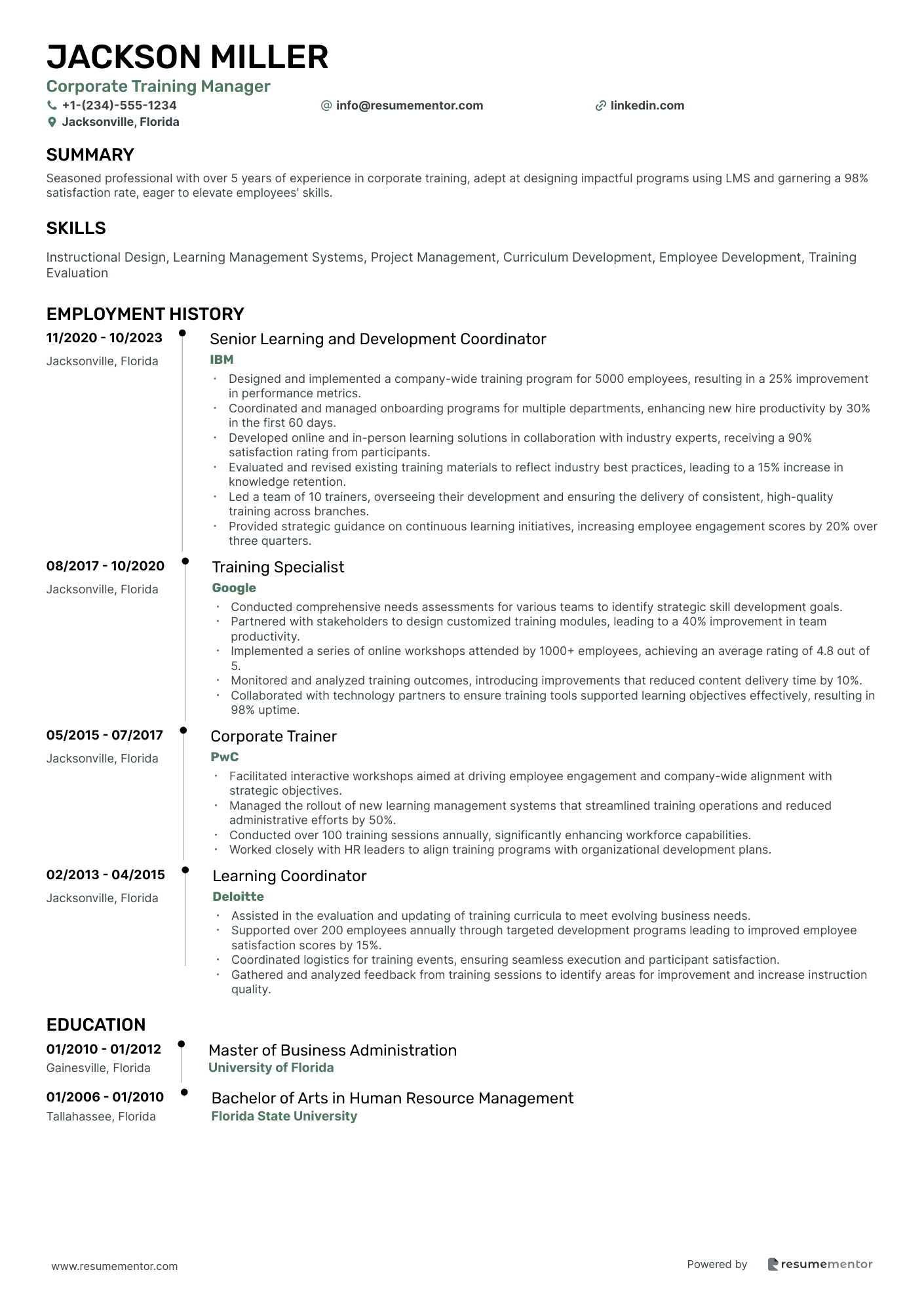
Corporate Training Manager
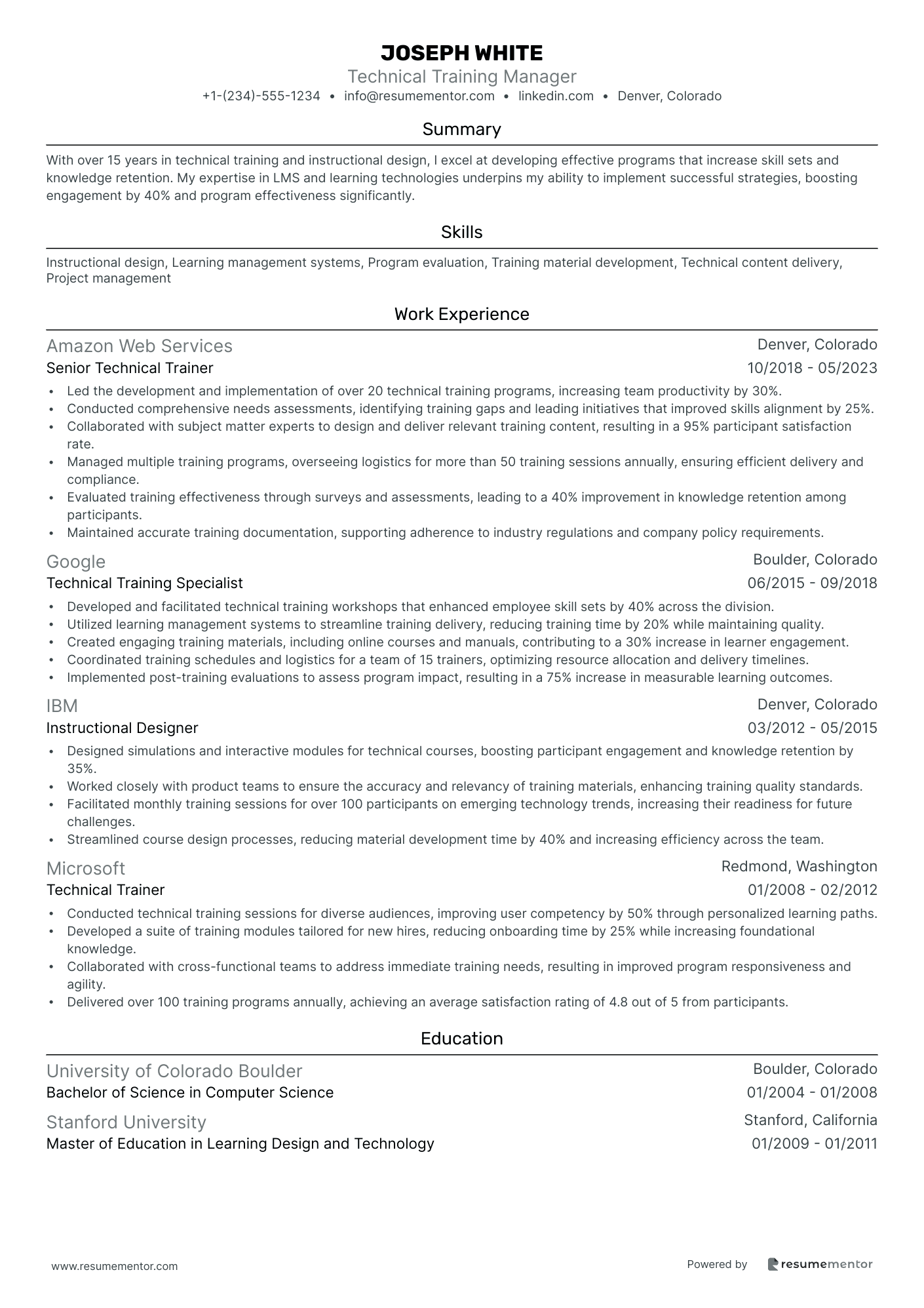
Technical Training Manager
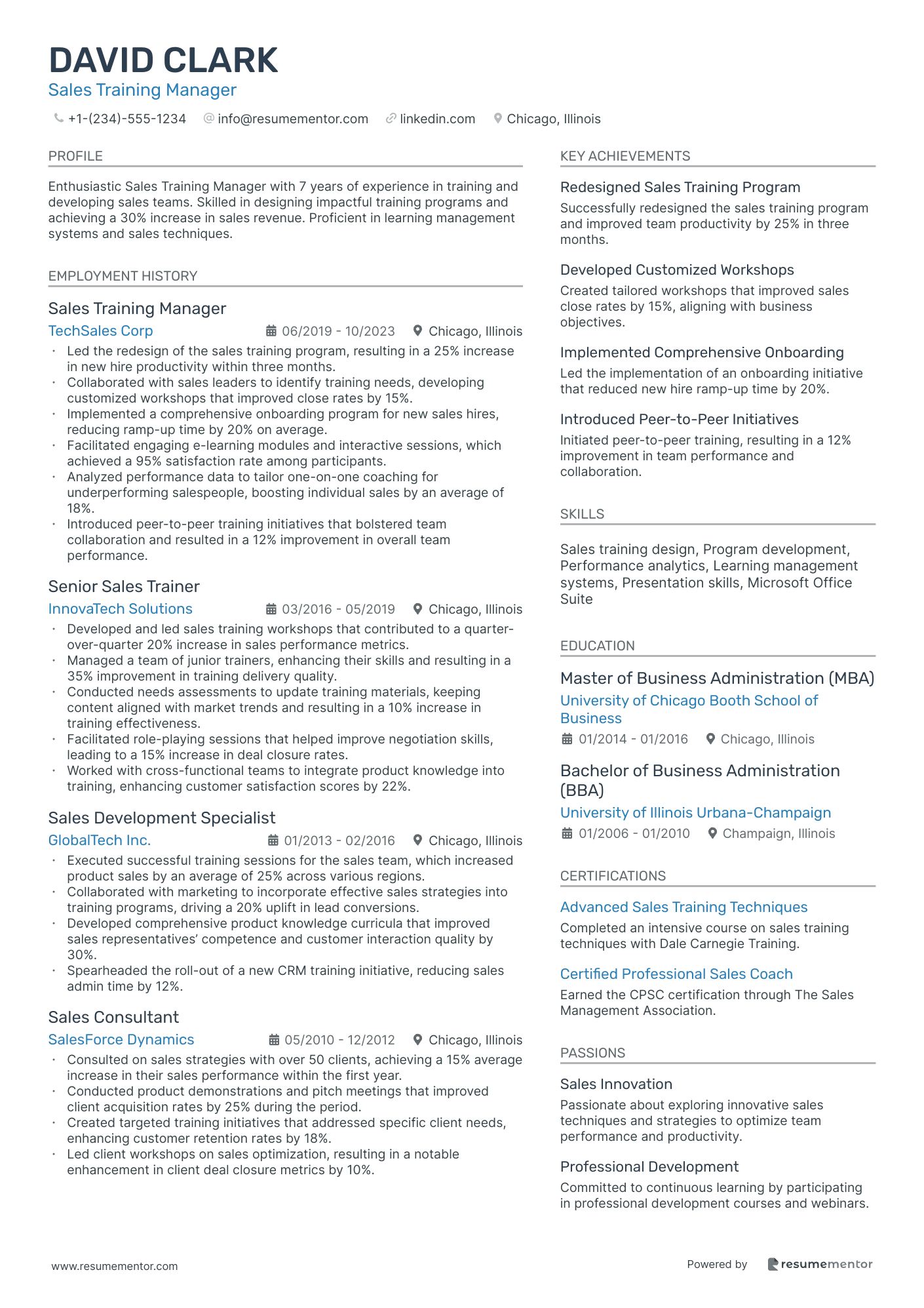
Sales Training Manager
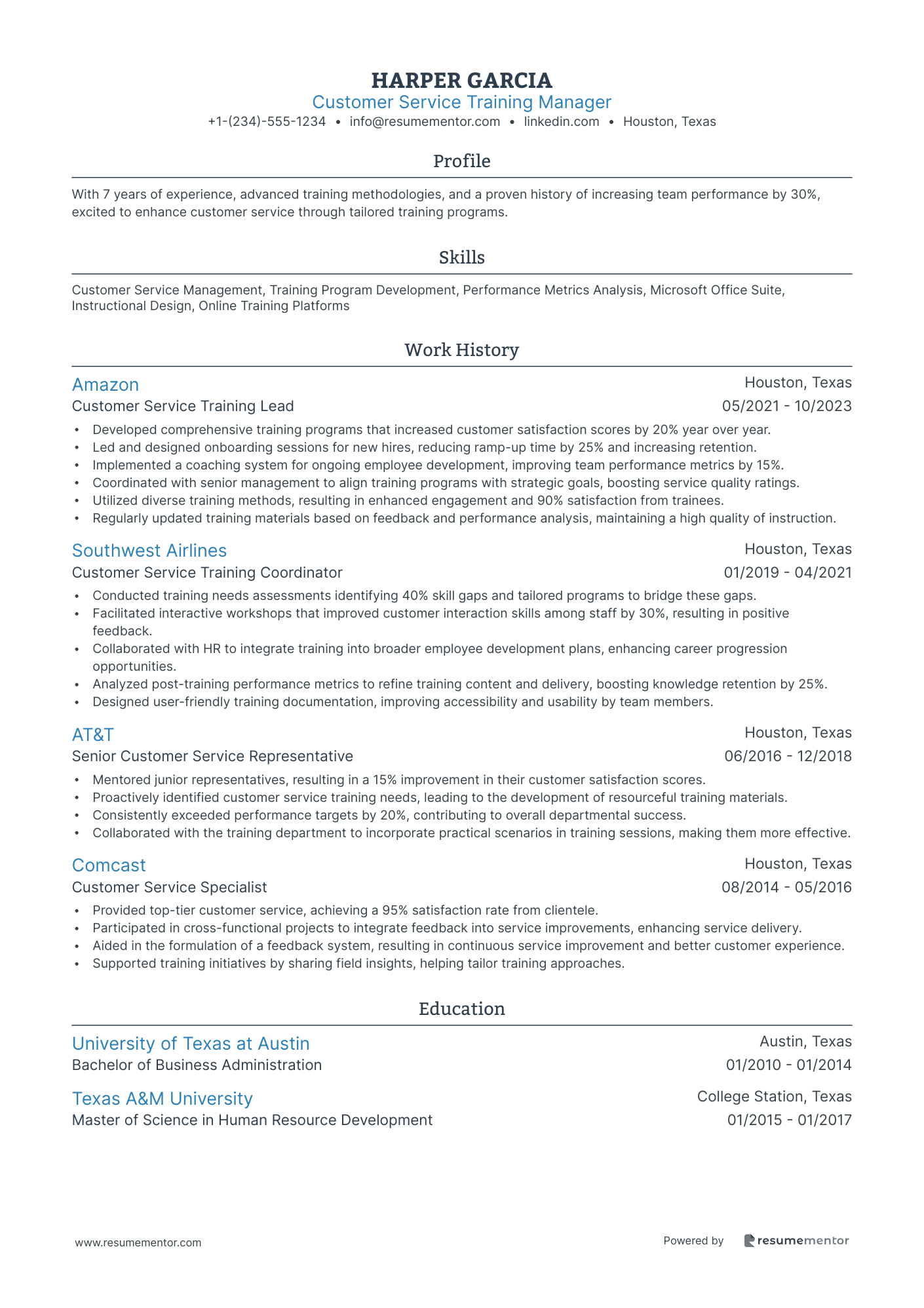
Customer Service Training Manager
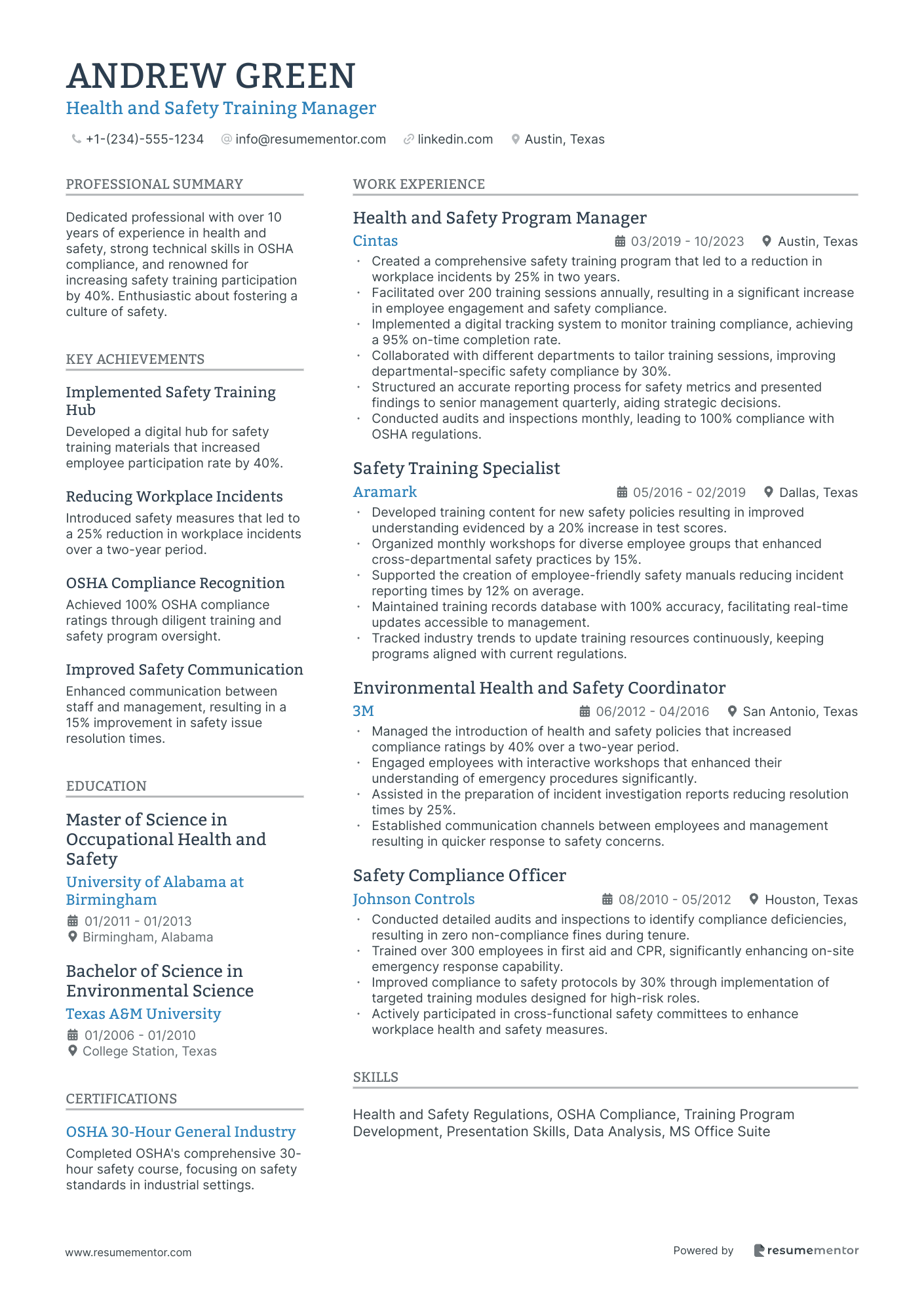
Health and Safety Training Manager
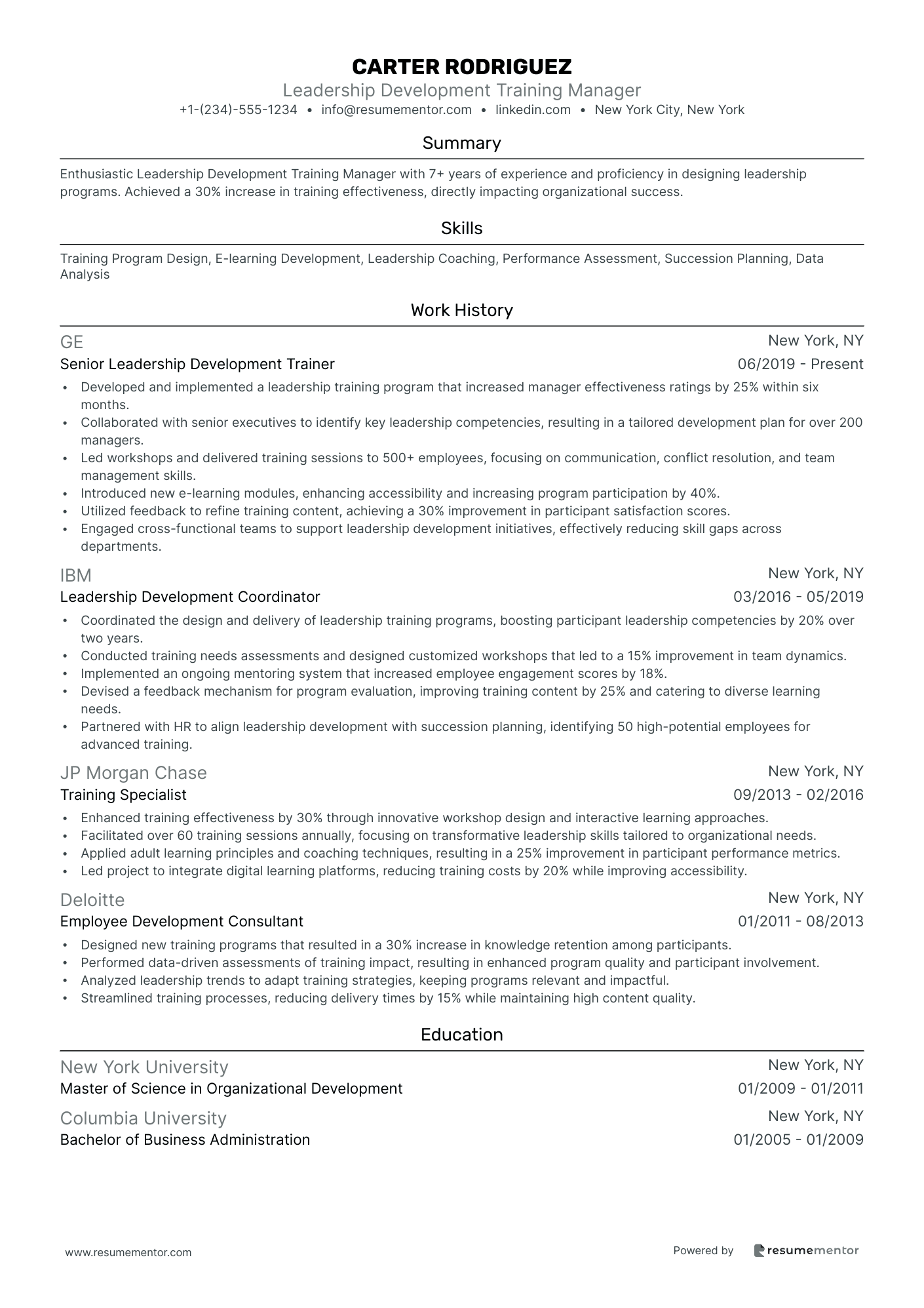
Leadership Development Training Manager
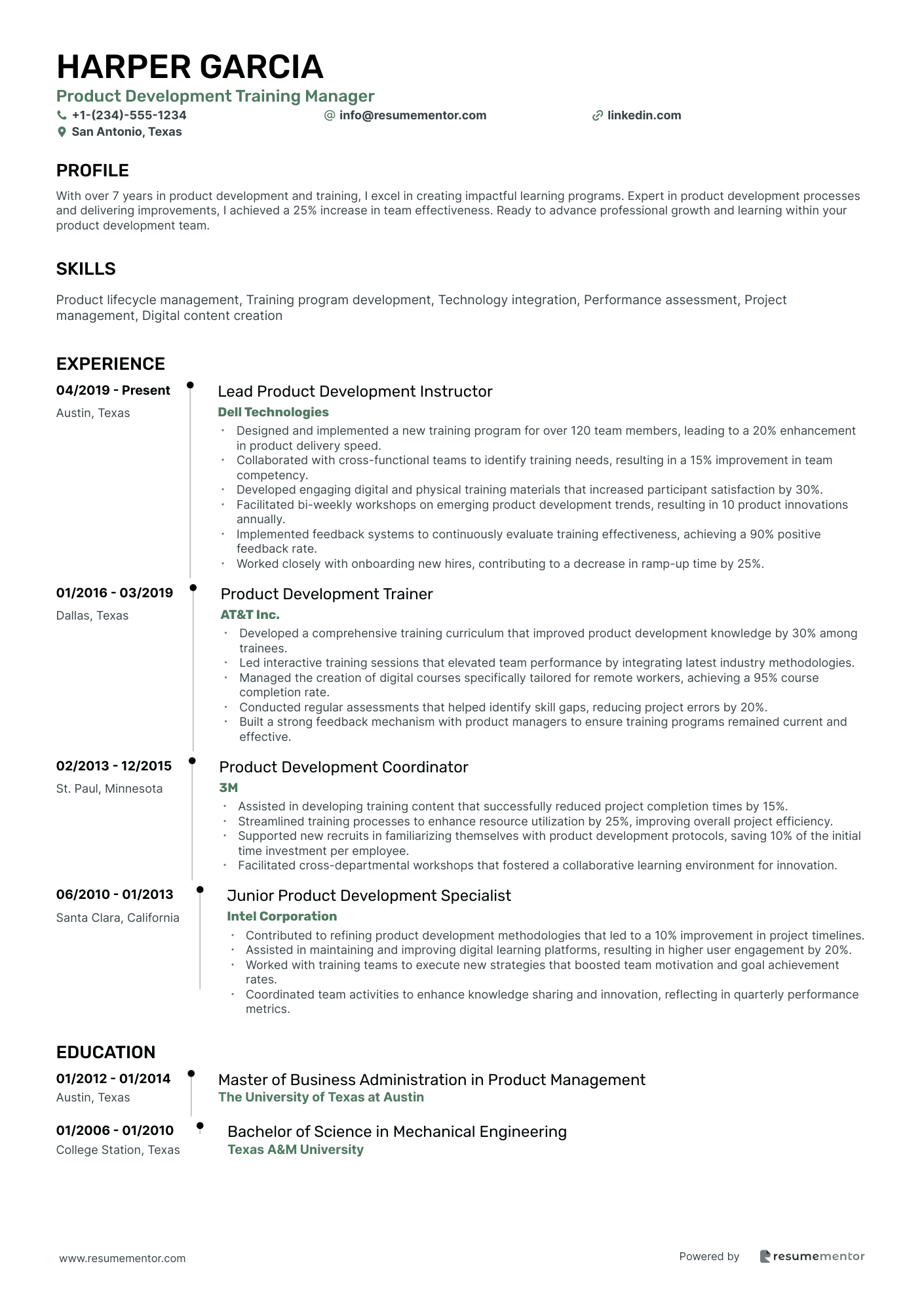
Product Development Training Manager
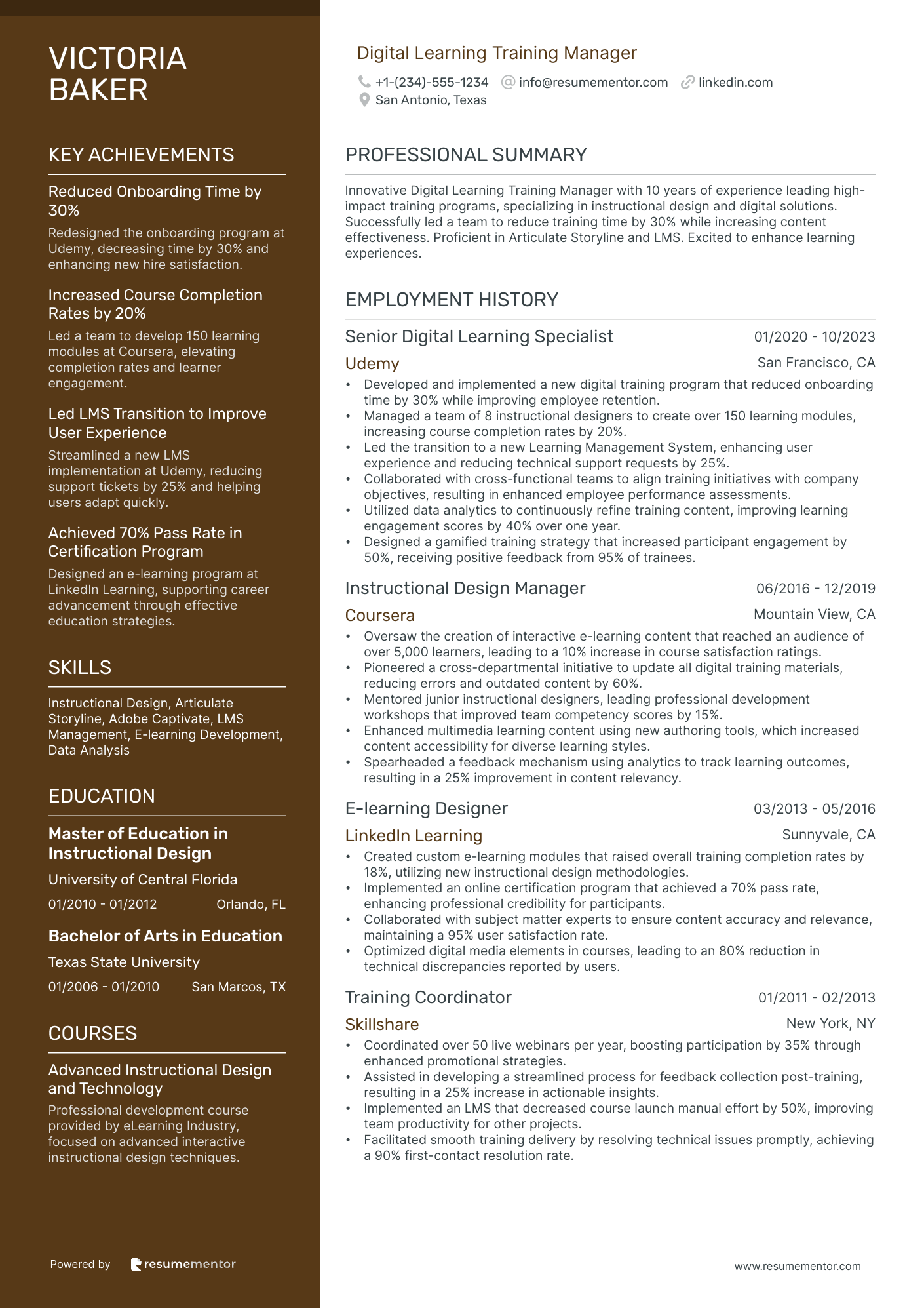
Digital Learning Training Manager
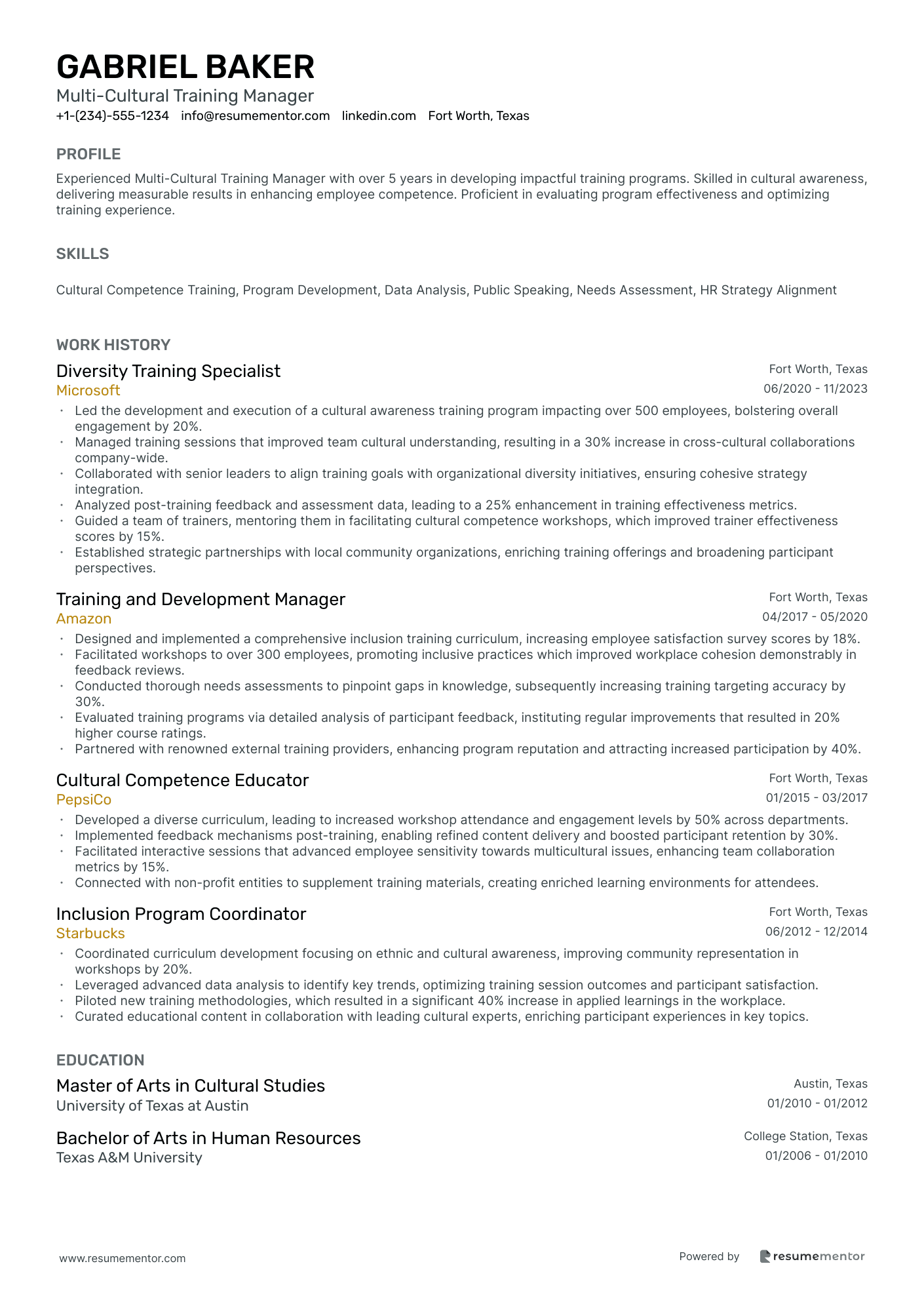
Multi-Cultural Training Manager
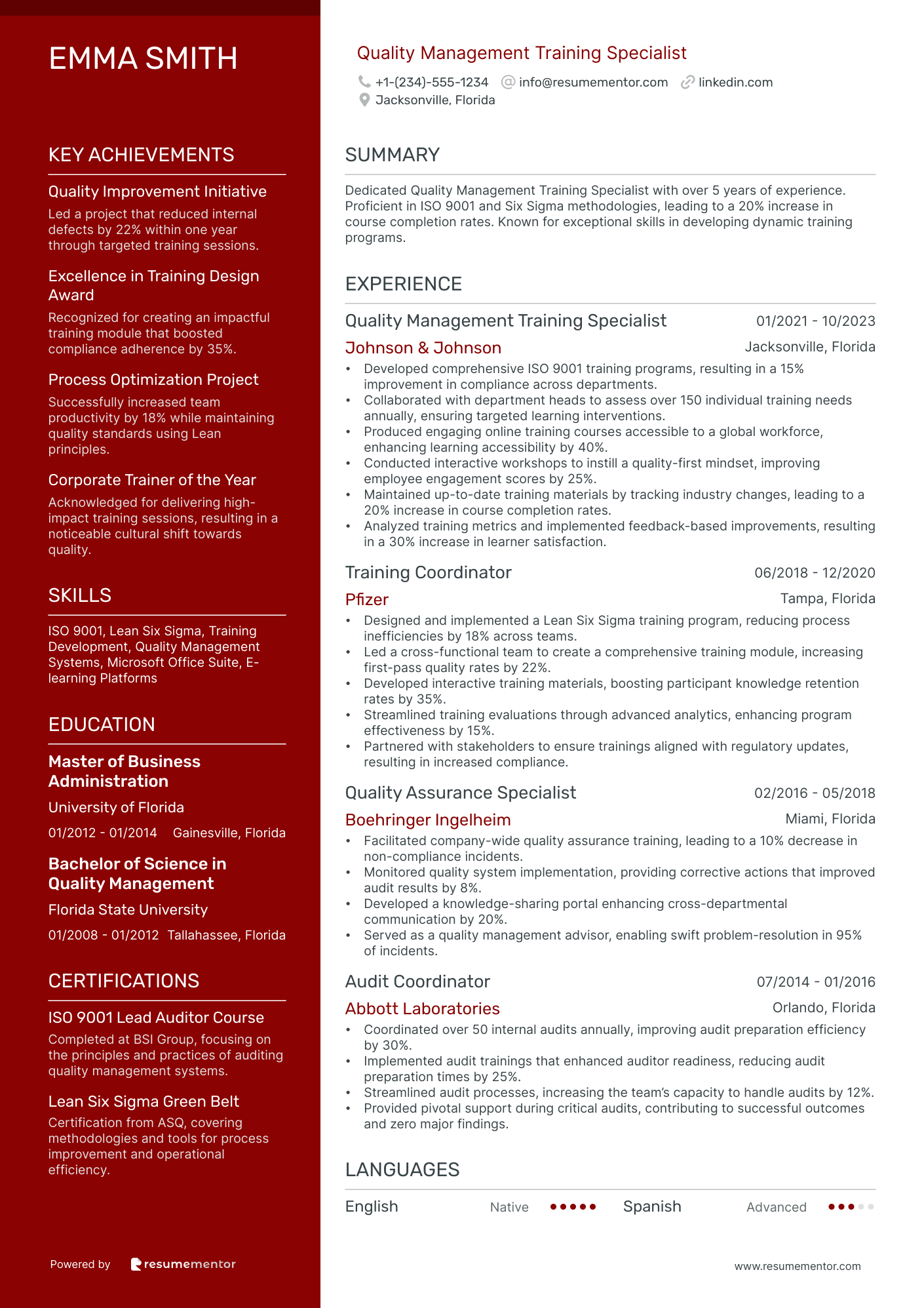
Quality Management Training Specialist

Corporate Training Manager resume sample
- •Designed and implemented a company-wide training program for 5000 employees, resulting in a 25% improvement in performance metrics.
- •Coordinated and managed onboarding programs for multiple departments, enhancing new hire productivity by 30% in the first 60 days.
- •Developed online and in-person learning solutions in collaboration with industry experts, receiving a 90% satisfaction rating from participants.
- •Evaluated and revised existing training materials to reflect industry best practices, leading to a 15% increase in knowledge retention.
- •Led a team of 10 trainers, overseeing their development and ensuring the delivery of consistent, high-quality training across branches.
- •Provided strategic guidance on continuous learning initiatives, increasing employee engagement scores by 20% over three quarters.
- •Conducted comprehensive needs assessments for various teams to identify strategic skill development goals.
- •Partnered with stakeholders to design customized training modules, leading to a 40% improvement in team productivity.
- •Implemented a series of online workshops attended by 1000+ employees, achieving an average rating of 4.8 out of 5.
- •Monitored and analyzed training outcomes, introducing improvements that reduced content delivery time by 10%.
- •Collaborated with technology partners to ensure training tools supported learning objectives effectively, resulting in 98% uptime.
- •Facilitated interactive workshops aimed at driving employee engagement and company-wide alignment with strategic objectives.
- •Managed the rollout of new learning management systems that streamlined training operations and reduced administrative efforts by 50%.
- •Conducted over 100 training sessions annually, significantly enhancing workforce capabilities.
- •Worked closely with HR leaders to align training programs with organizational development plans.
- •Assisted in the evaluation and updating of training curricula to meet evolving business needs.
- •Supported over 200 employees annually through targeted development programs leading to improved employee satisfaction scores by 15%.
- •Coordinated logistics for training events, ensuring seamless execution and participant satisfaction.
- •Gathered and analyzed feedback from training sessions to identify areas for improvement and increase instruction quality.
Technical Training Manager resume sample
- •Led the development and implementation of over 20 technical training programs, increasing team productivity by 30%.
- •Conducted comprehensive needs assessments, identifying training gaps and leading initiatives that improved skills alignment by 25%.
- •Collaborated with subject matter experts to design and deliver relevant training content, resulting in a 95% participant satisfaction rate.
- •Managed multiple training programs, overseeing logistics for more than 50 training sessions annually, ensuring efficient delivery and compliance.
- •Evaluated training effectiveness through surveys and assessments, leading to a 40% improvement in knowledge retention among participants.
- •Maintained accurate training documentation, supporting adherence to industry regulations and company policy requirements.
- •Developed and facilitated technical training workshops that enhanced employee skill sets by 40% across the division.
- •Utilized learning management systems to streamline training delivery, reducing training time by 20% while maintaining quality.
- •Created engaging training materials, including online courses and manuals, contributing to a 30% increase in learner engagement.
- •Coordinated training schedules and logistics for a team of 15 trainers, optimizing resource allocation and delivery timelines.
- •Implemented post-training evaluations to assess program impact, resulting in a 75% increase in measurable learning outcomes.
- •Designed simulations and interactive modules for technical courses, boosting participant engagement and knowledge retention by 35%.
- •Worked closely with product teams to ensure the accuracy and relevancy of training materials, enhancing training quality standards.
- •Facilitated monthly training sessions for over 100 participants on emerging technology trends, increasing their readiness for future challenges.
- •Streamlined course design processes, reducing material development time by 40% and increasing efficiency across the team.
- •Conducted technical training sessions for diverse audiences, improving user competency by 50% through personalized learning paths.
- •Developed a suite of training modules tailored for new hires, reducing onboarding time by 25% while increasing foundational knowledge.
- •Collaborated with cross-functional teams to address immediate training needs, resulting in improved program responsiveness and agility.
- •Delivered over 100 training programs annually, achieving an average satisfaction rating of 4.8 out of 5 from participants.
Sales Training Manager resume sample
- •Led the redesign of the sales training program, resulting in a 25% increase in new hire productivity within three months.
- •Collaborated with sales leaders to identify training needs, developing customized workshops that improved close rates by 15%.
- •Implemented a comprehensive onboarding program for new sales hires, reducing ramp-up time by 20% on average.
- •Facilitated engaging e-learning modules and interactive sessions, which achieved a 95% satisfaction rate among participants.
- •Analyzed performance data to tailor one-on-one coaching for underperforming salespeople, boosting individual sales by an average of 18%.
- •Introduced peer-to-peer training initiatives that bolstered team collaboration and resulted in a 12% improvement in overall team performance.
- •Developed and led sales training workshops that contributed to a quarter-over-quarter 20% increase in sales performance metrics.
- •Managed a team of junior trainers, enhancing their skills and resulting in a 35% improvement in training delivery quality.
- •Conducted needs assessments to update training materials, keeping content aligned with market trends and resulting in a 10% increase in training effectiveness.
- •Facilitated role-playing sessions that helped improve negotiation skills, leading to a 15% increase in deal closure rates.
- •Worked with cross-functional teams to integrate product knowledge into training, enhancing customer satisfaction scores by 22%.
- •Executed successful training sessions for the sales team, which increased product sales by an average of 25% across various regions.
- •Collaborated with marketing to incorporate effective sales strategies into training programs, driving a 20% uplift in lead conversions.
- •Developed comprehensive product knowledge curricula that improved sales representatives’ competence and customer interaction quality by 30%.
- •Spearheaded the roll-out of a new CRM training initiative, reducing sales admin time by 12%.
- •Consulted on sales strategies with over 50 clients, achieving a 15% average increase in their sales performance within the first year.
- •Conducted product demonstrations and pitch meetings that improved client acquisition rates by 25% during the period.
- •Created targeted training initiatives that addressed specific client needs, enhancing customer retention rates by 18%.
- •Led client workshops on sales optimization, resulting in a notable enhancement in client deal closure metrics by 10%.
Customer Service Training Manager resume sample
- •Developed comprehensive training programs that increased customer satisfaction scores by 20% year over year.
- •Led and designed onboarding sessions for new hires, reducing ramp-up time by 25% and increasing retention.
- •Implemented a coaching system for ongoing employee development, improving team performance metrics by 15%.
- •Coordinated with senior management to align training programs with strategic goals, boosting service quality ratings.
- •Utilized diverse training methods, resulting in enhanced engagement and 90% satisfaction from trainees.
- •Regularly updated training materials based on feedback and performance analysis, maintaining a high quality of instruction.
- •Conducted training needs assessments identifying 40% skill gaps and tailored programs to bridge these gaps.
- •Facilitated interactive workshops that improved customer interaction skills among staff by 30%, resulting in positive feedback.
- •Collaborated with HR to integrate training into broader employee development plans, enhancing career progression opportunities.
- •Analyzed post-training performance metrics to refine training content and delivery, boosting knowledge retention by 25%.
- •Designed user-friendly training documentation, improving accessibility and usability by team members.
- •Mentored junior representatives, resulting in a 15% improvement in their customer satisfaction scores.
- •Proactively identified customer service training needs, leading to the development of resourceful training materials.
- •Consistently exceeded performance targets by 20%, contributing to overall departmental success.
- •Collaborated with the training department to incorporate practical scenarios in training sessions, making them more effective.
- •Provided top-tier customer service, achieving a 95% satisfaction rate from clientele.
- •Participated in cross-functional projects to integrate feedback into service improvements, enhancing service delivery.
- •Aided in the formulation of a feedback system, resulting in continuous service improvement and better customer experience.
- •Supported training initiatives by sharing field insights, helping tailor training approaches.
Health and Safety Training Manager resume sample
- •Created a comprehensive safety training program that led to a reduction in workplace incidents by 25% in two years.
- •Facilitated over 200 training sessions annually, resulting in a significant increase in employee engagement and safety compliance.
- •Implemented a digital tracking system to monitor training compliance, achieving a 95% on-time completion rate.
- •Collaborated with different departments to tailor training sessions, improving departmental-specific safety compliance by 30%.
- •Structured an accurate reporting process for safety metrics and presented findings to senior management quarterly, aiding strategic decisions.
- •Conducted audits and inspections monthly, leading to 100% compliance with OSHA regulations.
- •Developed training content for new safety policies resulting in improved understanding evidenced by a 20% increase in test scores.
- •Organized monthly workshops for diverse employee groups that enhanced cross-departmental safety practices by 15%.
- •Supported the creation of employee-friendly safety manuals reducing incident reporting times by 12% on average.
- •Maintained training records database with 100% accuracy, facilitating real-time updates accessible to management.
- •Tracked industry trends to update training resources continuously, keeping programs aligned with current regulations.
- •Managed the introduction of health and safety policies that increased compliance ratings by 40% over a two-year period.
- •Engaged employees with interactive workshops that enhanced their understanding of emergency procedures significantly.
- •Assisted in the preparation of incident investigation reports reducing resolution times by 25%.
- •Established communication channels between employees and management resulting in quicker response to safety concerns.
- •Conducted detailed audits and inspections to identify compliance deficiencies, resulting in zero non-compliance fines during tenure.
- •Trained over 300 employees in first aid and CPR, significantly enhancing on-site emergency response capability.
- •Improved compliance to safety protocols by 30% through implementation of targeted training modules designed for high-risk roles.
- •Actively participated in cross-functional safety committees to enhance workplace health and safety measures.
Leadership Development Training Manager resume sample
- •Developed and implemented a leadership training program that increased manager effectiveness ratings by 25% within six months.
- •Collaborated with senior executives to identify key leadership competencies, resulting in a tailored development plan for over 200 managers.
- •Led workshops and delivered training sessions to 500+ employees, focusing on communication, conflict resolution, and team management skills.
- •Introduced new e-learning modules, enhancing accessibility and increasing program participation by 40%.
- •Utilized feedback to refine training content, achieving a 30% improvement in participant satisfaction scores.
- •Engaged cross-functional teams to support leadership development initiatives, effectively reducing skill gaps across departments.
- •Coordinated the design and delivery of leadership training programs, boosting participant leadership competencies by 20% over two years.
- •Conducted training needs assessments and designed customized workshops that led to a 15% improvement in team dynamics.
- •Implemented an ongoing mentoring system that increased employee engagement scores by 18%.
- •Devised a feedback mechanism for program evaluation, improving training content by 25% and catering to diverse learning needs.
- •Partnered with HR to align leadership development with succession planning, identifying 50 high-potential employees for advanced training.
- •Enhanced training effectiveness by 30% through innovative workshop design and interactive learning approaches.
- •Facilitated over 60 training sessions annually, focusing on transformative leadership skills tailored to organizational needs.
- •Applied adult learning principles and coaching techniques, resulting in a 25% improvement in participant performance metrics.
- •Led project to integrate digital learning platforms, reducing training costs by 20% while improving accessibility.
- •Designed new training programs that resulted in a 30% increase in knowledge retention among participants.
- •Performed data-driven assessments of training impact, resulting in enhanced program quality and participant involvement.
- •Analyzed leadership trends to adapt training strategies, keeping programs relevant and impactful.
- •Streamlined training processes, reducing delivery times by 15% while maintaining high content quality.
Product Development Training Manager resume sample
- •Designed and implemented a new training program for over 120 team members, leading to a 20% enhancement in product delivery speed.
- •Collaborated with cross-functional teams to identify training needs, resulting in a 15% improvement in team competency.
- •Developed engaging digital and physical training materials that increased participant satisfaction by 30%.
- •Facilitated bi-weekly workshops on emerging product development trends, resulting in 10 product innovations annually.
- •Implemented feedback systems to continuously evaluate training effectiveness, achieving a 90% positive feedback rate.
- •Worked closely with onboarding new hires, contributing to a decrease in ramp-up time by 25%.
- •Developed a comprehensive training curriculum that improved product development knowledge by 30% among trainees.
- •Led interactive training sessions that elevated team performance by integrating latest industry methodologies.
- •Managed the creation of digital courses specifically tailored for remote workers, achieving a 95% course completion rate.
- •Conducted regular assessments that helped identify skill gaps, reducing project errors by 20%.
- •Built a strong feedback mechanism with product managers to ensure training programs remained current and effective.
- •Assisted in developing training content that successfully reduced project completion times by 15%.
- •Streamlined training processes to enhance resource utilization by 25%, improving overall project efficiency.
- •Supported new recruits in familiarizing themselves with product development protocols, saving 10% of the initial time investment per employee.
- •Facilitated cross-departmental workshops that fostered a collaborative learning environment for innovation.
- •Contributed to refining product development methodologies that led to a 10% improvement in project timelines.
- •Assisted in maintaining and improving digital learning platforms, resulting in higher user engagement by 20%.
- •Worked with training teams to execute new strategies that boosted team motivation and goal achievement rates.
- •Coordinated team activities to enhance knowledge sharing and innovation, reflecting in quarterly performance metrics.
Digital Learning Training Manager resume sample
- •Developed and implemented a new digital training program that reduced onboarding time by 30% while improving employee retention.
- •Managed a team of 8 instructional designers to create over 150 learning modules, increasing course completion rates by 20%.
- •Led the transition to a new Learning Management System, enhancing user experience and reducing technical support requests by 25%.
- •Collaborated with cross-functional teams to align training initiatives with company objectives, resulting in enhanced employee performance assessments.
- •Utilized data analytics to continuously refine training content, improving learning engagement scores by 40% over one year.
- •Designed a gamified training strategy that increased participant engagement by 50%, receiving positive feedback from 95% of trainees.
- •Oversaw the creation of interactive e-learning content that reached an audience of over 5,000 learners, leading to a 10% increase in course satisfaction ratings.
- •Pioneered a cross-departmental initiative to update all digital training materials, reducing errors and outdated content by 60%.
- •Mentored junior instructional designers, leading professional development workshops that improved team competency scores by 15%.
- •Enhanced multimedia learning content using new authoring tools, which increased content accessibility for diverse learning styles.
- •Spearheaded a feedback mechanism using analytics to track learning outcomes, resulting in a 25% improvement in content relevancy.
- •Created custom e-learning modules that raised overall training completion rates by 18%, utilizing new instructional design methodologies.
- •Implemented an online certification program that achieved a 70% pass rate, enhancing professional credibility for participants.
- •Collaborated with subject matter experts to ensure content accuracy and relevance, maintaining a 95% user satisfaction rate.
- •Optimized digital media elements in courses, leading to an 80% reduction in technical discrepancies reported by users.
- •Coordinated over 50 live webinars per year, boosting participation by 35% through enhanced promotional strategies.
- •Assisted in developing a streamlined process for feedback collection post-training, resulting in a 25% increase in actionable insights.
- •Implemented an LMS that decreased course launch manual effort by 50%, improving team productivity for other projects.
- •Facilitated smooth training delivery by resolving technical issues promptly, achieving a 90% first-contact resolution rate.
Multi-Cultural Training Manager resume sample
- •Led the development and execution of a cultural awareness training program impacting over 500 employees, bolstering overall engagement by 20%.
- •Managed training sessions that improved team cultural understanding, resulting in a 30% increase in cross-cultural collaborations company-wide.
- •Collaborated with senior leaders to align training goals with organizational diversity initiatives, ensuring cohesive strategy integration.
- •Analyzed post-training feedback and assessment data, leading to a 25% enhancement in training effectiveness metrics.
- •Guided a team of trainers, mentoring them in facilitating cultural competence workshops, which improved trainer effectiveness scores by 15%.
- •Established strategic partnerships with local community organizations, enriching training offerings and broadening participant perspectives.
- •Designed and implemented a comprehensive inclusion training curriculum, increasing employee satisfaction survey scores by 18%.
- •Facilitated workshops to over 300 employees, promoting inclusive practices which improved workplace cohesion demonstrably in feedback reviews.
- •Conducted thorough needs assessments to pinpoint gaps in knowledge, subsequently increasing training targeting accuracy by 30%.
- •Evaluated training programs via detailed analysis of participant feedback, instituting regular improvements that resulted in 20% higher course ratings.
- •Partnered with renowned external training providers, enhancing program reputation and attracting increased participation by 40%.
- •Developed a diverse curriculum, leading to increased workshop attendance and engagement levels by 50% across departments.
- •Implemented feedback mechanisms post-training, enabling refined content delivery and boosted participant retention by 30%.
- •Facilitated interactive sessions that advanced employee sensitivity towards multicultural issues, enhancing team collaboration metrics by 15%.
- •Connected with non-profit entities to supplement training materials, creating enriched learning environments for attendees.
- •Coordinated curriculum development focusing on ethnic and cultural awareness, improving community representation in workshops by 20%.
- •Leveraged advanced data analysis to identify key trends, optimizing training session outcomes and participant satisfaction.
- •Piloted new training methodologies, which resulted in a significant 40% increase in applied learnings in the workplace.
- •Curated educational content in collaboration with leading cultural experts, enriching participant experiences in key topics.
Quality Management Training Specialist resume sample
- •Developed comprehensive ISO 9001 training programs, resulting in a 15% improvement in compliance across departments.
- •Collaborated with department heads to assess over 150 individual training needs annually, ensuring targeted learning interventions.
- •Produced engaging online training courses accessible to a global workforce, enhancing learning accessibility by 40%.
- •Conducted interactive workshops to instill a quality-first mindset, improving employee engagement scores by 25%.
- •Maintained up-to-date training materials by tracking industry changes, leading to a 20% increase in course completion rates.
- •Analyzed training metrics and implemented feedback-based improvements, resulting in a 30% increase in learner satisfaction.
- •Designed and implemented a Lean Six Sigma training program, reducing process inefficiencies by 18% across teams.
- •Led a cross-functional team to create a comprehensive training module, increasing first-pass quality rates by 22%.
- •Developed interactive training materials, boosting participant knowledge retention rates by 35%.
- •Streamlined training evaluations through advanced analytics, enhancing program effectiveness by 15%.
- •Partnered with stakeholders to ensure trainings aligned with regulatory updates, resulting in increased compliance.
- •Facilitated company-wide quality assurance training, leading to a 10% decrease in non-compliance incidents.
- •Monitored quality system implementation, providing corrective actions that improved audit results by 8%.
- •Developed a knowledge-sharing portal enhancing cross-departmental communication by 20%.
- •Served as a quality management advisor, enabling swift problem-resolution in 95% of incidents.
- •Coordinated over 50 internal audits annually, improving audit preparation efficiency by 30%.
- •Implemented audit trainings that enhanced auditor readiness, reducing audit preparation times by 25%.
- •Streamlined audit processes, increasing the team’s capacity to handle audits by 12%.
- •Provided pivotal support during critical audits, contributing to successful outcomes and zero major findings.
In the realm of learning and development, you are like a skilled conductor, orchestrating a seamless symphony of knowledge and growth. Your talent for motivating and developing others has made you indispensable in any organization. Yet when it's time to translate this into a resume, the task of connecting your past experiences with future aspirations can feel daunting.
Crafting a resume that brings your achievements front and center is crucial for making your role clear to potential employers. Many opportunities are missed due to resumes that aren't structured effectively. By using a resume template, you can organize and highlight your skills in a way that captures attention and emphasizes your expertise. This structure helps potential employers quickly grasp the true value you bring to the table.
It’s essential to weave your leadership and industry skills into a cohesive story. A well-structured resume transforms your experience into a powerful narrative, showcasing your ability to manage learning programs, adapt to evolving training needs, and measure success in initiatives. This coherent narrative can set you apart in a crowded field.
Selecting the right resume template aligns your experience with your career goals, ensuring you present yourself in the best possible light. Explore this comprehensive collection of resume templates to find one that fits your style and needs. Taking this step can transform how future employers perceive your career journey, making your next chapter a masterpiece.
Key Takeaways
- Using a structured resume template helps in presenting your skills and experiences effectively, making your value clear to potential employers.
- A well-structured resume tells a cohesive story of your leadership and industry skills, helping distinguish you from others in a competitive field.
- The reverse-chronological format is particularly effective for training managers as it highlights career progression and relevant experiences.
- Emphasizing both hard and soft skills is crucial, showcasing your technical and interpersonal abilities that are essential for training management roles.
- Including a certificates section in your resume is key for a training manager, demonstrating your expertise and commitment to professional development.
What to focus on when writing your training manager resume
A training manager resume should clearly convey your expertise in creating and implementing effective learning programs. Recruiters are looking for evidence of your ability to lead training teams, assess program success, and enhance organizational skills. To catch their eye, highlight your leadership abilities, attention to detail, and how you leverage data in decision-making.
How to structure your training manager resume
- Contact Information — Starting your resume with accurate contact information is essential. Your full name, phone number, and professional email address set the stage for first impressions. Including a LinkedIn profile adds credibility to your professional persona and offers a more detailed view of your career. This foundational section ensures recruiters can easily reach out to you, signaling your readiness for communication.
- Summary Statement — This section acts as a snapshot of your professional narrative. Capture your key strengths in training management and leadership. Your ability to develop programs and lead teams should stand out. Use this section to provide a quick but compelling reason why you're the right fit, showing how your skills align with the job’s requirements.
- Professional Experience — Here, delve into your work history, focusing squarely on roles related to training management. Use action-oriented language to express your key contributions and outcomes achieved, such as introducing impactful training programs or boosting engagement metrics. This section illustrates your career journey and professional growth.
- Skills — Clearly list skills pivotal to a training manager's role, such as curriculum design, leadership capabilities, familiarity with Learning Management Systems, and methods of performance evaluation. Highlight specialized skills that set you apart, demonstrating your ability to meet the unique challenges of the role.
- Education — Presenting your educational background connects your academic achievements to your career path. Include any relevant degrees, certifications, and specialized training courses that underline your aptitude in education or training development. This section adds depth to your professional profile, showing a commitment to your field.
- Achievements — This section should showcase your tangible successes through measurable outcomes. Focus on accomplishments like cost reductions in training programs or enhanced completion rates. These achievements offer concrete examples of your impact and effectiveness as a training manager.
As we move forward, understanding the optimal resume format ensures everything flows coherently—below, we’ll cover each section more in-depth.
Which resume format to choose
As a training manager, making a strong first impression with your resume is vital, and choosing the right format is the first step. The reverse-chronological format is particularly effective because it showcases your career progression and highlights the experiences most relevant to the role. This clear and organized structure makes it easy for hiring managers to quickly grasp your accomplishments and areas of expertise, setting you apart in the competitive training industry.
When it comes to font choices, opt for modern options like Rubik, Montserrat, or Chivo. These fonts offer a clean and contemporary look, which aligns well with professional standards. They help your resume appear fresh and easy to read, underscoring your attention to detail—an important trait for a training manager who must communicate clearly and effectively.
Ensuring consistency in presentation is crucial, which is why saving your resume as a PDF is the best practice. PDFs preserve your chosen format, ensuring that your resume looks the same whether viewed on a computer or a mobile device. This reliability across platforms underscores your professionalism and care in presentation—a quality highly valued in any managerial role.
The importance of readability is also seen in margin settings. Keeping margins at one inch on all sides ensures a neat appearance and enhances readability. It creates a pleasant balance between text and white space, making information easier to consume. This detail is key in showcasing your organizational skills and ensuring that your content shines without appearing overcrowded.
By focusing on these elements, your resume not only reflects your skills and organizational abilities but also positions you as a capable and detail-oriented training manager. These considerations together form a comprehensive approach to crafting a powerful resume that can effectively communicate your qualifications and readiness for the role.
How to write a quantifiable resume experience section
The experience section of your training manager resume is crucial for showcasing your skills and accomplishments. It's important to highlight quantifiable achievements that clearly demonstrate your impact. By structuring your resume in reverse chronological order, you ensure your most relevant roles stand out. Typically, you'll want to include positions from the last 10-15 years, especially those titles that align well with the job you're targeting.
Tailoring your experience to the job description makes your resume even more compelling. Focus on emphasizing responsibilities and accomplishments that mirror what's in the job ad. Use engaging action words like "developed," "implemented," "led," and "enhanced" to vividly convey your contributions. These dynamic verbs not only bring your experience to life but also showcase your proactive approach in previous roles.
Here's an example for a training manager role:
- •Developed and implemented a training curriculum that increased employee productivity by 30%.
- •Led a team of 10 trainers to deliver over 500 hours of instruction annually.
- •Streamlined onboarding process, reducing training time by 20% and improving new hire satisfaction scores by 25%.
- •Coordinated cross-departmental learning initiatives that improved employee engagement scores by 40%.
This example excels because it clearly quantifies your achievements, making the impact of your efforts evident and compelling. Each bullet point is crafted with strong action words and data, seamlessly illustrating your role and contributions. By incorporating specifics that highlight your effectiveness, you connect your experience directly to employer expectations, boosting your chances of grabbing their attention.
Furthermore, using percentages and data shows your capacity for improving operations and performance. When you tailor your examples to reflect the needs outlined in the job ad, you demonstrate how past successes can translate into future wins for the company. This approach turns your experience into a compelling narrative, clearly conveying your value to potential employers.
Training and Development Focused resume experience section
A training-focused manager resume experience section should showcase how you've improved training programs and led your teams to new heights. Begin by organizing your experiences in chronological order, ensuring a clear progression. It's essential to emphasize what you've achieved, not just the tasks you've handled, by detailing specific programs you've created and their outcomes. This highlights crucial skills such as communication, leadership, and strategic planning, making your contributions stand out.
Incorporating numbers to illustrate your successes will make your resume more compelling. For each role, keep descriptions straightforward, focusing on accomplishments with clean bullet points. Use metrics like the number of employees trained or performance improvements to underscore your effectiveness. Start each point with strong action verbs to bring your impact to life and keep the reader engaged.
Training and Development Manager
Innovative Learning Solutions
June 2019 - Present
- Redesigned a training program, boosting efficiency by 30% and improving trainee assessments.
- Created a leadership workshop that raised managerial performance by 25% in six months.
- Partnered with cross-functional teams to spot training needs, increasing employee satisfaction by 15%.
- Launched an e-learning platform, cutting costs and reaching over 500 remote employees.
Project-Focused resume experience section
A project-focused training manager resume experience section should clearly showcase your leadership in guiding successful projects. Emphasize how your skills in designing and implementing training programs directly align with project goals, leading to improved outcomes. Be specific about your achievements by detailing projects that resulted in measurable improvements and highlight your role in fostering collaboration. Demonstrate how you effectively brought teams together to achieve shared success and illustrate your adaptability in overcoming project challenges.
Begin bullet points with powerful action verbs and highlight clear results to capture attention. Whenever possible, use metrics to quantify your achievements and make them more impactful. Focus on projects where your contributions made a significant difference, showcasing your capability to handle complex situations. This approach reflects your expertise and makes your resume particularly appealing to potential employers.
Training Manager
Tech Solutions Inc.
June 2019 – May 2023
- Led a team to develop a new training curriculum, which increased employee productivity by 25%.
- Coordinated cross-department teams to implement a project management tool, cutting project timelines by 30%.
- Designed and executed a remote training program that boosted staff retention rates by 15%.
- Conducted regular training assessments to identify gaps, improving satisfaction scores by 40%.
Responsibility-Focused resume experience section
A responsibility-focused training manager resume experience section should clearly demonstrate how you managed key duties and delivered successful outcomes. Begin by highlighting the main tasks you took on, such as overseeing training programs or crafting learning strategies. Use clear language to describe your achievements and the positive changes your contributions brought to the organization. It's crucial to emphasize your leadership skills and smooth management of teams or projects.
As you elaborate, include specific results or metrics that underscore your responsible handling of the role. Mention any awards or recognitions received for your efforts, which shows potential employers the real impact you've had in previous positions. By blending responsibilities with accomplishments in your bullet points, you create a compelling and cohesive portrayal of your experience that leaves a strong impression.
Training Manager
PREMIER Consulting
June 2018 - Present
- Led the development and implementation of a new training curriculum that increased employee productivity by 25%.
- Managed a team of 8 trainers, ensuring consistent delivery of high-quality training programs across all departments.
- Oversaw budget management for training programs, successfully delivering under budget by 10% annually.
- Established a feedback system that improved employee satisfaction with training sessions by 40%.
Achievement-Focused resume experience section
An achievement-focused training manager resume experience section should showcase your accomplishments and contributions effectively. Begin by emphasizing specific results, such as improved team performance or successful program implementations, supported by quantifiable metrics for added credibility. With a consistent structure, you enable potential employers to quickly recognize your strengths and impact.
By focusing on achievements rather than daily tasks, you demonstrate the value you can bring to future employers. Carefully select experiences that highlight your ability to drive change and achieve results. Formatting these experiences using bullet points enhances readability, with each point starting with a strong action verb to clearly convey your accomplishments and their impact. This method ensures your resume stands out and effectively communicates your professional worth.
Training Manager
XYZ Corporation
2018-2023
- Led a team of 10 trainers and delivered over 200 training sessions, boosting team performance by 30%.
- Created a training program that cut onboarding time by 40%, saving the company $50,000 each year.
- Implemented new performance tracking systems, upping departmental efficiency by 25%.
- Mentored junior trainers, achieving a 95% satisfaction rate with training processes among new hires.
Write your training manager resume summary section
A training manager-focused resume summary should effectively showcase your leadership and development skills. This brief section at the top of your resume paints a quick picture of who you are professionally, highlighting your ability to lead and nurture talent. Consider your summary as a snapshot that grabs the recruiter's attention by emphasizing your key achievements. For those with experience, this section is your chance to shine a spotlight on what you’ve accomplished, making you stand out to potential employers. Here’s an example of how a training manager might craft their summary:
This summary skillfully integrates the candidate’s accomplishments with measurable results, creating an engaging narrative. If you’re new to the field, consider using a resume objective instead. Objectives highlight your future goals and what you aim to achieve in a specific position, which can be ideal for entry-level candidates. While both summaries and objectives serve similar purposes, they’re distinct from a resume profile, which provides a broader overview of your career path. On the other hand, a summary of qualifications lists key abilities in a straightforward, bullet-point format. Choose the approach that best complements your experience and aligns with the role you’re pursuing. Tailoring your section to the job description ensures a stronger connection with the job and potential employer right from the start.
Listing your training manager skills on your resume
A skills-focused training manager resume should effectively highlight your strengths and abilities. The skills section can stand alone or be seamlessly integrated into your experience and summary sections. By emphasizing your strengths and soft skills, you can showcase your ability to collaborate well with others and handle diverse situations. Meanwhile, demonstrating hard skills underscores the technical expertise you’ve developed through your training and experience.
Incorporating skills and strengths into your resume acts as strategic keywords, helping to make your application stand out. These keywords should align closely with job descriptions to effectively communicate your qualifications.
Here's a sample of a standalone skills section formatted in JSON:
This skills section is designed to be clear and concise, honing in on competencies that are directly relevant to a training manager role. Each skill is carefully selected to appeal to employers seeking someone capable of managing training initiatives effectively. Listing eight pertinent skills offers a comprehensive yet focused view, making it easy for readers to quickly discern your core competencies.
Best hard skills to feature on your training manager resume
As a training manager, having strong hard skills is essential for showcasing your practical expertise. These skills convey your capacity to design, develop, and implement training programs efficiently:
Hard Skills
- Training Program Development
- Learning Management Systems (LMS)
- Instructional Design
- Data Analysis
- E-learning Platform Management
- Performance Evaluation
- Curriculum Design
- Budget Management
- Needs Assessment
- Content Creation
- Technical Training
- Microsoft Office Proficiency
- Project Management
- Remote Training Delivery
- Compliance Training
Best soft skills to feature on your training manager resume
Equally important are the soft skills that reflect your interpersonal and leadership abilities. These skills illustrate how adept you are at managing both people and complex situations:
Soft Skills
- Communication
- Leadership
- Problem-solving
- Adaptability
- Emotional Intelligence
- Team Collaboration
- Conflict Resolution
- Organizational Skills
- Time Management
- Motivational Skills
- Patience
- Creativity
- Decision-making
- Critical Thinking
- Empathy
How to include your education on your resume
The education section of your resume is vital. It highlights your academic background and can set you apart from other candidates. Tailor this section to suit the training manager role you're pursuing by only including relevant education credentials. Omit unrelated education details. Include your GPA if it’s impressive, typically 3.5 or higher, and specify that it is out of a 4.0 scale. If you graduated with honors like cum laude, mention it next to your degree. When listing your degree, start with the name of the degree, followed by your major, the institution, and the year of graduation.
Here is an example of an incorrect education section:
Now, here is an example of a strong education section:
The second example is outstanding because it is directly relevant to a training manager position. It lists a degree in business, a field closely related to management and training roles. The inclusion of a high GPA demonstrates strong academic performance, further strengthening your candidacy. Tailoring your education section this way highlights your qualifications effectively and makes a strong impression on potential employers.
How to include training manager certificates on your resume
Including a certificates section on your resume is crucial as a training manager. Start by listing the name of the certificate. Include the date you received it to show your expertise is up-to-date. Add the issuing organization so employers see the credibility. This section boosts your qualifications and sets you apart from others.
If you prefer, you can include certificates in the header near your contact info. For example, "John Doe, Certified Training Professional (2022)" makes your qualifications prominent.
Here's a good standalone example:
This example is effective because it includes relevant certificates, provides the issuing organization, and shows recent qualifications. It highlights skills specific to the training manager role. This ensures employers see your dedication and proficiency. Your resume will stand out with such a detailed and relevant certificates section.
Extra sections to include in your training manager resume
When crafting a resume for a training manager position, it's crucial to highlight key sections that showcase your skills and interests. Each section of your resume can provide insight into your capabilities and personality, setting you apart from other candidates.
Language section — Highlight diverse language skills to show your ability to train a broad audience. This can enhance your communication effectiveness and cross-cultural training capabilities.
Hobbies and interests section — Demonstrate your ability to engage with teams by sharing relevant hobbies. This can highlight skills such as teamwork, creativity, and leadership.
Volunteer work section — Emphasize your commitment to giving back to the community. This can demonstrate leadership, initiative, and a willingness to develop skills outside of work.
Books section — Share books related to training and development that you have read. This shows your commitment to personal and professional growth and can highlight your continuous learning mindset.
Each section, if thoughtfully included, can create a well-rounded picture of who you are and how you will fit into the training manager role. These pieces of information can make you more relatable and demonstrate attributes that go beyond your formal qualifications.
In Conclusion
In conclusion, writing an effective resume as a training manager is an art worth mastering. Your resume must serve as a powerful tool that showcases your expertise, experiences, and aspirations. By using a well-designed template, you can organize your information in a way that captivates employers. Highlighting your leadership skills and achievements helps paint a compelling picture of your career journey. It's not just about listing your past roles; it's about telling a story that aligns with your future career goals. Tailoring each section—experience, skills, education, and additional qualifications—ensures that every component enhances your narrative. Always remember to choose a format that best represents your growth and capabilities. Whether it’s using numbers to quantify your success or choosing strong action verbs to describe your impact, these elements work together to strengthen your resume's effectiveness. Each part of your resume is a stepping stone, building a complete picture of what you offer as a training manager. By focusing on clarity and coherence, you enhance your chances of standing out in a competitive field. With thoughtful presentation, your resume can open doors to exciting new opportunities.
Related Articles

Continue Reading
Check more recommended readings to get the job of your dreams.
Resume
Resources
Tools
© 2026. All rights reserved.
Made with love by people who care.

